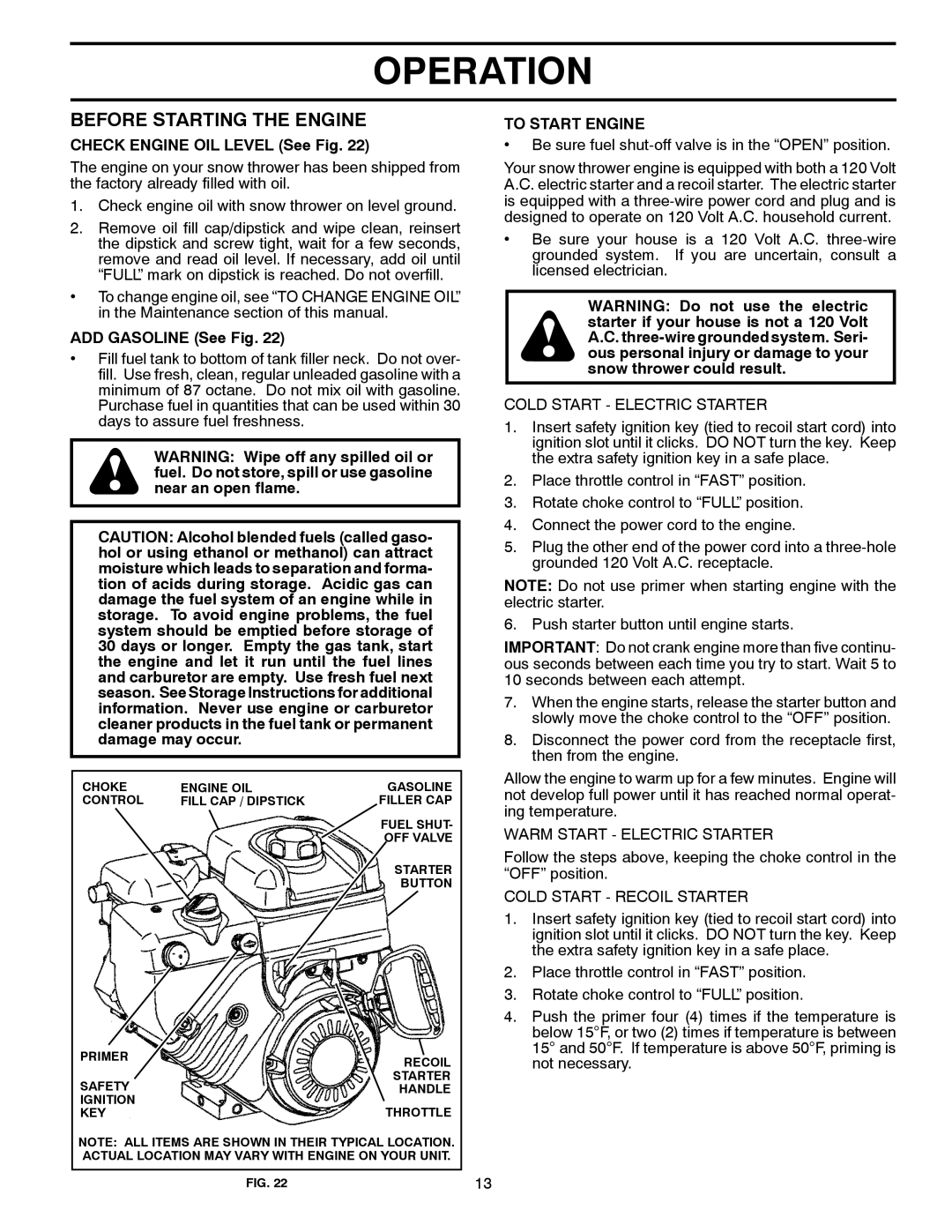
OPERATION
BEFORE STARTING THE ENGINE
CHECK ENGINE OIL LEVEL (See Fig. 22)
The engine on your snow thrower has been shipped from the factory already filled with oil.
1.Check engine oil with snow thrower on level ground.
2.Remove oil fill cap/dipstick and wipe clean, reinsert the dipstick and screw tight, wait for a few seconds, remove and read oil level. If necessary, add oil until “FULL” mark on dipstick is reached. Do not overfill.
•To change engine oil, see “TO CHANGE ENGINE OIL” in the Maintenance section of this manual.
ADD GASOLINE (See Fig. 22)
•Fill fuel tank to bottom of tank filler neck. Do not over- fill. Use fresh, clean, regular unleaded gasoline with a minimum of 87 octane. Do not mix oil with gasoline. Purchase fuel in quantities that can be used within 30 days to assure fuel freshness.
WARNING: Wipe off any spilled oil or fuel. Do not store, spill or use gasoline near an open flame.
CAUTION: Alcohol blended fuels (called gaso- hol or using ethanol or methanol) can attract moisture which leads to separation and forma- tion of acids during storage. Acidic gas can damage the fuel system of an engine while in storage. To avoid engine problems, the fuel system should be emptied before storage of 30 days or longer. Empty the gas tank, start the engine and let it run until the fuel lines and carburetor are empty. Use fresh fuel next season. See Storage Instructions for additional information. Never use engine or carburetor cleaner products in the fuel tank or permanent damage may occur.
CHOKE | ENGINE OIL | GASOLINE |
CONTROL | FILL CAP / DIPSTICK | FILLER CAP |
|
| FUEL SHUT- |
|
| OFF VALVE |
|
| STARTER |
|
| BUTTON |
PRIMER | RECOIL |
| |
SAFETY | STARTER |
HANDLE | |
IGNITION | THROTTLE |
KEY |
NOTE: ALL ITEMS ARE SHOWN IN THEIR TYPICAL LOCATION. ACTUAL LOCATION MAY VARY WITH ENGINE ON YOUR UNIT.
TO START ENGINE
•Be sure fuel shut-off valve is in the “OPEN” position.
Your snow thrower engine is equipped with both a 120 Volt A.C. electric starter and a recoil starter. The electric starter is equipped with a
•Be sure your house is a 120 Volt A.C.
WARNING: Do not use the electric starter if your house is not a 120 Volt A.C.
COLD START - ELECTRIC STARTER
1.Insert safety ignition key (tied to recoil start cord) into ignition slot until it clicks. DO NOT turn the key. Keep the extra safety ignition key in a safe place.
2.Place throttle control in “FAST” position.
3.Rotate choke control to “FULL” position.
4.Connect the power cord to the engine.
5.Plug the other end of the power cord into a
NOTE: Do not use primer when starting engine with the electric starter.
6. Push starter button until engine starts.
IMPORTANT: Do not crank engine more than five continu- ous seconds between each time you try to start. Wait 5 to 10 seconds between each attempt.
7.When the engine starts, release the starter button and slowly move the choke control to the “OFF” position.
8.Disconnect the power cord from the receptacle first, then from the engine.
Allow the engine to warm up for a few minutes. Engine will not develop full power until it has reached normal operat- ing temperature.
WARM START - ELECTRIC STARTER
Follow the steps above, keeping the choke control in the “OFF” position.
COLD START - RECOIL STARTER
1.Insert safety ignition key (tied to recoil start cord) into ignition slot until it clicks. DO NOT turn the key. Keep the extra safety ignition key in a safe place.
2.Place throttle control in “FAST” position.
3.Rotate choke control to “FULL” position.
4.Push the primer four (4) times if the temperature is below 15°F, or two (2) times if temperature is between 15° and 50°F. If temperature is above 50°F, priming is not necessary.
FIG. 22 | 13 |
